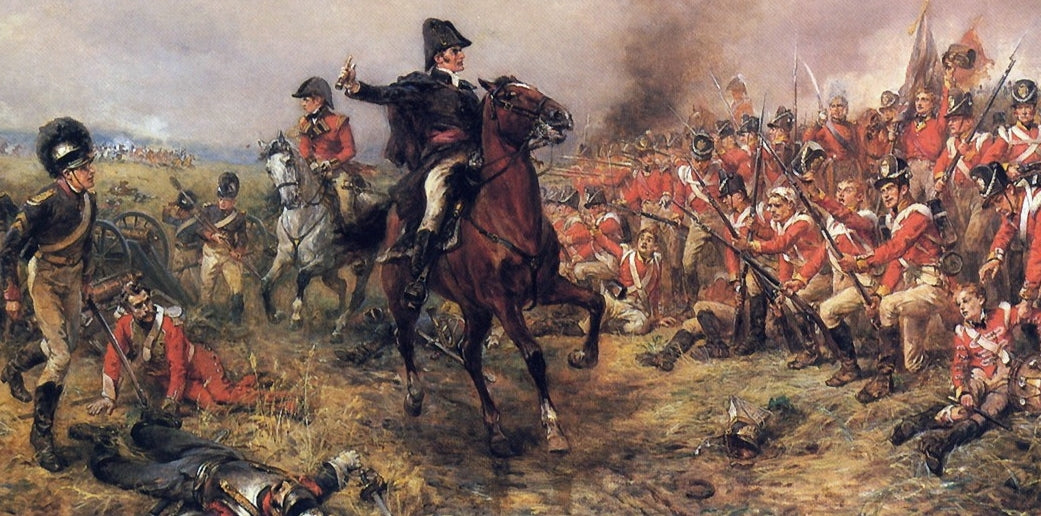For the next ten weeks, we will be publishing a ten part series introducing ten greatest generals of the Napoleonic Wars in no particular order. This is inevitably a subjective assessment, but we hope that readers will agree with most of our choices. If not, well... that's what the comments section is for.
We start with the Duke of Wellington, whose inclusion in this list should not be in any doubt.
Arthur Wellesley, Duke of Wellington (1769-1852)
One of the greatest soldiers in British history, Arthur Wellesley was born in Ireland into the Anglo-Irish aristocracy in 1769, the same year of Napoleon’s birth. After dabbling in Irish politics, he bought a commission in the British army and first saw action in Flanders during the War of the First Coalition. In 1796 he sailed for India, where his brother Richard, 2nd Earl of Mornington, was soon appointed Governor-General. The young Arthur made a name for himself at the Battle of Seringapatam (1799) as the commander of the 33rd Regiment of Foot, before securing an impressive victory over the forces of the Maratha Confederacy at the Battle of Assaye in 1803.
Wellesley’s exploits in India earned him the nickname ‘the Sepoy General,’ often in a derisive tone. In 1808 he was dispatched to Portugal to assist the Portuguese in resisting a French invasion army under Jean-Andoche Junot. In August he defeated Junot at Vimeiro near Lisbon but was immediately superceded in command by the newly-arrived Sir Hew Dalrymple, who stopped the pursuit and allowed the French to escape. At the end of the month Dalrymple signed the Convention of Sintra with Junot, which allowed the French to evacuate their men from Portugal. The generous terms granted to the French were seen as a national disgrace. Wellesley had to return to Britain to face an inquiry but was cleared and returned to the Iberian Peninsula the following year.
Meanwhile, Napoleon had taken it upon himself to invade Portugal via Spain, successfully cornering the British contingent under Sir John Moore. Moore decided to head to Corunna on the northern coast of Spain where the Royal Navy was waiting to evacuate the British troops. Although the British successfully evacuated much of their army, Moore was killed during the rearguard action. Wellesley advocated the return of British troops to Portugal and was appointed its commander.
After arriving in Lisbon in 1809, Wellesley took the offensive and consolidated control of Portugal. He then advanced into Spain and defeated Marshal Victor at Talavera alongside General Cuesta’s Spanish army. In recognition he was awarded the title Viscount Wellington, and would be known as Lord Wellington for the remainder of his career. In 1810, faced with a large invasion force under Marshal Massena, Wellington was forced to take the defensive behind the Lines of Torres Vedras, a series of defensive fortifications in southern Portugal which served to shelter the British and Portuguese troops from enemy attacks. The lines held firm and forced the French to retreat. Throughout the Peninsular War, Wellington proved himself a skilled defensive commander who knew how to use the mountainous terrain of the Iberian Peninsula to his advantage.
Wellington continued to gain the upper hand of Napoleon’s marshals and in 1812 invaded Spain once again, capturing the fortresses of Ciudad Rodrigo and Badajoz. With Napoleon away in Russia and no reinforcements at hand, the French were driven back and suffered defeat at the Battle of Salamanca in July. Wellington’s series saw him become an Earl and later Marquess. The following year, with the French forces further weakened by Napoleon’s efforts to rebuild the army he lost in Russia, Wellington renewed his campaign and won a great victory over King Joseph Bonaparte at the Battle of Vitoria on 21 June 1813. The victory won him a field marshal’s baton, and was the subject of Ludwig van Beethoven’s battle symphony Wellington’s Victory, one of Beethoven’s worst and most lucrative compositions. The French presence in Spain was no longer viable and Wellington chased the enemy to Southwest France, where the French surrendered upon learning of Napoleon’s abdication. Wellington’s contribution to the allied victory won him the title of Duke of Wellington.
In late 1814 he was appointed Ambassador to France and replaced Foreign Secretary Lord Castlereagh as the leader of the British delegation at the Congress of Vienna, where the victorious allies – and France – attempted to create a post-Napoleonic European order. Wellington was in Vienna when he heard of Napoleon’s escape from Elba and hurried to take up command of an Anglo-Dutch-German army in Belgium. In conjunction with the Prussian army under Field Marshal Blücher, Wellington defeated Napoleon at Waterloo and definitively ended Napoleon’s career.
The Battle of Waterloo was the last battle Wellington fought. A national hero, he became an increasingly influential political figure in the Tory Party and became Prime Minister in 1828. His signature achievement as Prime Minister was the passage of the Catholic Relief Act which granted civil rights to Catholics in the United Kingdom. He threatened to resign in order to encourage King George IV to grant Royal Assent to the bill. Nevertheless, Wellington was politically conservative and opposed to the increasing clamour for political reform, for which he received the nickname Iron Duke.
He was forced to resign in 1830, paving the way for Earl Grey’s Whigs to come to power and pass the Great Reform Act of 1832, which considerably widened the franchise for the House of Commons. When Grey’s government fell in 1834, Wellington was asked to form a government but refused and suggested Peel instead. As Peel was away in Sicily, Wellington temporarily served as prime minister for a month until his return. He served in Peel’s cabinet and retained considerable political influence. The Duke of Wellington died in September 1852 and given a state funeral at St Paul’s Cathedral.
Did you enjoy reading about the Duke of Wellington? Check out our Great Britain collection, which includes several Wellington designs and products.





Share and get 15% off!
Simply share this product on one of the following social networks and you will unlock 15% off!